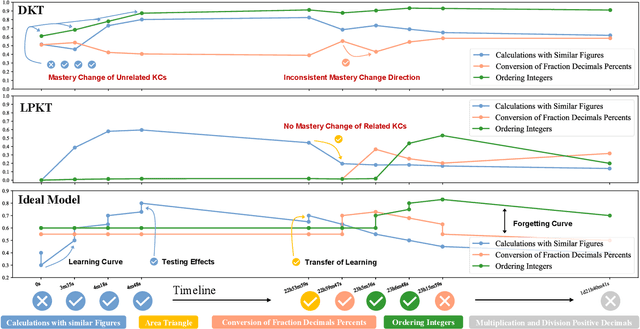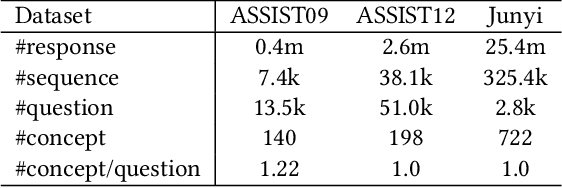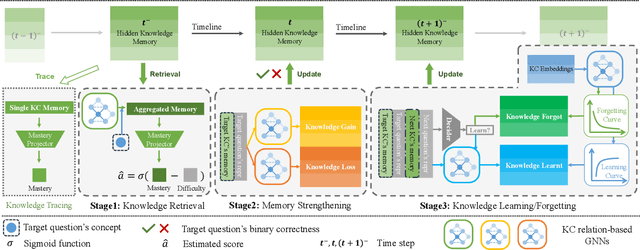Jiajun Cui
Leveraging Pedagogical Theories to Understand Student Learning Process with Graph-based Reasonable Knowledge Tracing
Jun 07, 2024



Abstract:Knowledge tracing (KT) is a crucial task in intelligent education, focusing on predicting students' performance on given questions to trace their evolving knowledge. The advancement of deep learning in this field has led to deep-learning knowledge tracing (DLKT) models that prioritize high predictive accuracy. However, many existing DLKT methods overlook the fundamental goal of tracking students' dynamical knowledge mastery. These models do not explicitly model knowledge mastery tracing processes or yield unreasonable results that educators find difficulty to comprehend and apply in real teaching scenarios. In response, our research conducts a preliminary analysis of mainstream KT approaches to highlight and explain such unreasonableness. We introduce GRKT, a graph-based reasonable knowledge tracing method to address these issues. By leveraging graph neural networks, our approach delves into the mutual influences of knowledge concepts, offering a more accurate representation of how the knowledge mastery evolves throughout the learning process. Additionally, we propose a fine-grained and psychological three-stage modeling process as knowledge retrieval, memory strengthening, and knowledge learning/forgetting, to conduct a more reasonable knowledge tracing process. Comprehensive experiments demonstrate that GRKT outperforms eleven baselines across three datasets, not only enhancing predictive accuracy but also generating more reasonable knowledge tracing results. This makes our model a promising advancement for practical implementation in educational settings. The source code is available at https://github.com/JJCui96/GRKT.
Differentiating Student Feedbacks for Knowledge Tracing
Dec 16, 2022



Abstract:In computer-aided education and intelligent tutoring systems, knowledge tracing (KT) raises attention due to the development of data-driven learning methods, which aims to predict students' future performance given their past question response sequences to trace their knowledge states. However, current deep learning approaches only focus on enhancing prediction accuracy, but neglecting the discrimination imbalance of responses. That is, a considerable proportion of question responses are weak to discriminate students' knowledge states, but equally considered compared to other discriminative responses, thus hurting the ability of tracing students' personalized knowledge states. To tackle this issue, we propose DR4KT for Knowledge Tracing, which reweights the contribution of different responses according to their discrimination in training. For retaining high prediction accuracy on low discriminative responses after reweighting, DR4KT also introduces a discrimination-aware score fusion technique to make a proper combination between student knowledge mastery and the questions themselves. Comprehensive experimental results show that our DR4KT applied on four mainstream KT methods significantly improves their performance on three widely-used datasets.
 Add to Chrome
Add to Chrome Add to Firefox
Add to Firefox Add to Edge
Add to Edge